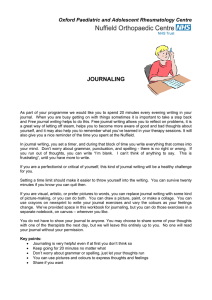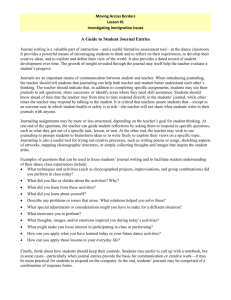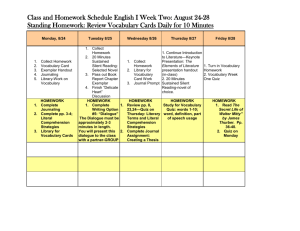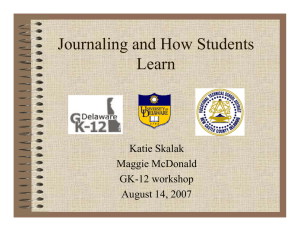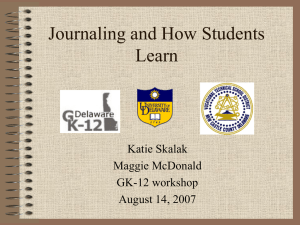Document 14539059
advertisement
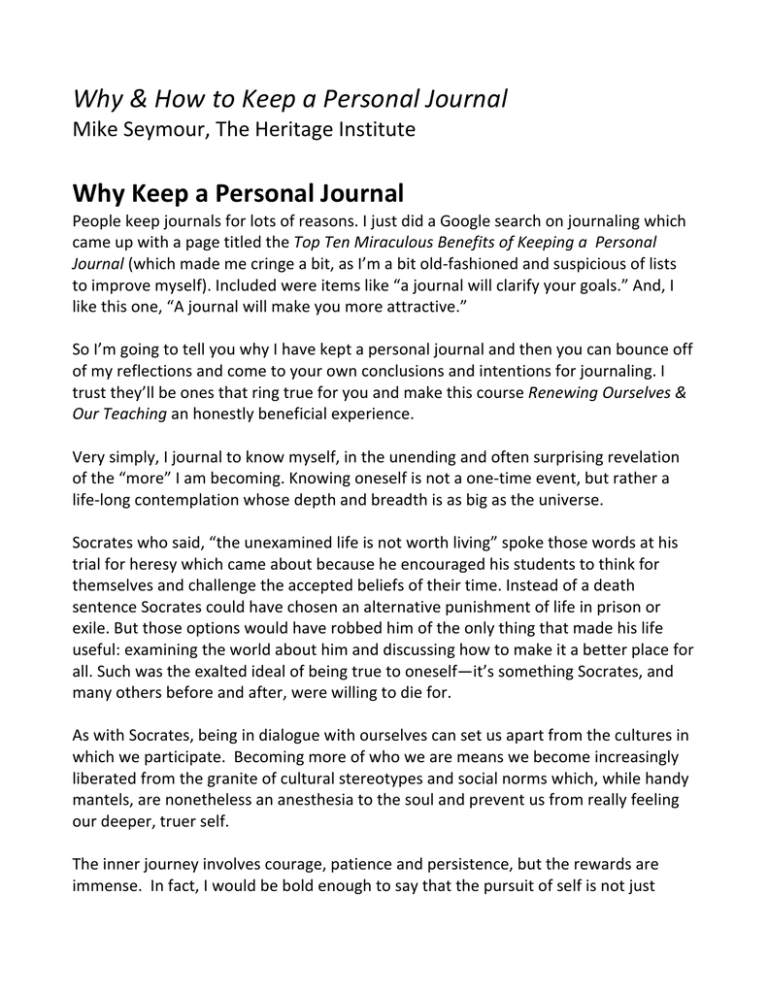
Why & How to Keep a Personal Journal Mike Seymour, The Heritage Institute Why Keep a Personal Journal People keep journals for lots of reasons. I just did a Google search on journaling which came up with a page titled the Top Ten Miraculous Benefits of Keeping a Personal Journal (which made me cringe a bit, as I’m a bit old-­‐fashioned and suspicious of lists to improve myself). Included were items like “a journal will clarify your goals.” And, I like this one, “A journal will make you more attractive.” So I’m going to tell you why I have kept a personal journal and then you can bounce off of my reflections and come to your own conclusions and intentions for journaling. I trust they’ll be ones that ring true for you and make this course Renewing Ourselves & Our Teaching an honestly beneficial experience. Very simply, I journal to know myself, in the unending and often surprising revelation of the “more” I am becoming. Knowing oneself is not a one-­‐time event, but rather a life-­‐long contemplation whose depth and breadth is as big as the universe. Socrates who said, “the unexamined life is not worth living” spoke those words at his trial for heresy which came about because he encouraged his students to think for themselves and challenge the accepted beliefs of their time. Instead of a death sentence Socrates could have chosen an alternative punishment of life in prison or exile. But those options would have robbed him of the only thing that made his life useful: examining the world about him and discussing how to make it a better place for all. Such was the exalted ideal of being true to oneself—it’s something Socrates, and many others before and after, were willing to die for. As with Socrates, being in dialogue with ourselves can set us apart from the cultures in which we participate. Becoming more of who we are means we become increasingly liberated from the granite of cultural stereotypes and social norms which, while handy mantels, are nonetheless an anesthesia to the soul and prevent us from really feeling our deeper, truer self. The inner journey involves courage, patience and persistence, but the rewards are immense. In fact, I would be bold enough to say that the pursuit of self is not just “another” thing to do—one more task on our already bloated lists of tasks—but it is the one ultimate thing around which our entire lives revolve. Or it should be, and too often isn’t because we have lost sight of what’s paramount. Our most essential mission and calling in life is to help midwife the life we’ve been given into the fullness of its own being. How to Start a Personal Journal There is plenty of writing on journaling. Perhaps the best-­‐known and longest standing expert I know of is Ira Progoff, founder of the Intensive Journal Program (http://intensivejournal.org/index.php) and author of numerous books around self-­‐ development through liberation of the deeper elements in the human psyche. At one time I read a portion of one of his early books, but found its 400+ page length daunting and so I put the book down. Some people, and you may be one of them, can really make use of texts and workshops on journaling, and in other areas of my life I have been a voracious consumer of the same. Oddly it seemed best just to find my own way intuitively into journal keeping, as the spirit moved and in a way that did not stand between me and a sense of connecting with something inside. Sometimes, when I follow instructions of a book or from a workshop, the attention I give to that can distract from feeling my inner life in an authentic way. So, I wound up learning simply how to follow my inner prompting. I committed myself to the discipline of being quiet and open over enough hours, days and years that a sense of inner voice and inner knowing just naturally began to emerge. So how to begin? I suggest finding an attractive notebook or journal to write in. I’ve had many over the last thirty years—some small without lined paper and others larger and with lines that help me keep my writing straight. The key thing is to find a notebook that feels special to you—which “speaks” to you. The more you like what you’re writing in, the more likely you are to use it. I’ll come back to this simple rule of attraction time and again, because what we’re attracted to tells us something about our inner life that we may not fully comprehend. We can learn, in time, to trust and follow our attractions, and learn when they are good for us as opposed to just being “eye candy” and not so good for us. There’s something about writing with pen or pencil that connects the body more with the deeper mind. So, start out by writing with pen and notebook, and then perhaps try writing on your computer if you feel you can maintain the sense of connectedness. When you sit down to write, you might have specific expectations, questions and situations you want to explore. Or you might simply want to doodle and wander around with words. I would like to think there’s no right way, and want to relieve myself of the burden of having to do journaling in a certain way. Just start in a way that feels right—which you can connect with. I’ve had a practice of dating my entries and also naming the location—like 9/2/78, Bellingham, WA. That way when I go back months or perhaps years later and review what I wrote, I get a sense of how my inner life unfolded over time. Many of my entries have started very simply, like “Woke up this morning and couldn’t get back to sleep.” Or I’ve started my entry with how I am feeling “Feeling depressed and tired today.” And then wait and see what wants to come next. Sometimes there’s a lot of waiting. You’ll find impatience is an enemy of the soul, so cut yourself some slack. Don’t expect to be gushing with insights right away or every time you write. If that happens, great but the fruit of the soul comes in its own season, and we’re best not to rush it. Often I’ve sat down to write and felt blank, in which case I would write “I’m feeling blank right now, like there’s nothing going on.” Truth is a great liberator, so be honest with yourself. Many times these blank states once identified and accepted flow into a rich river of words and images—you just never know. The Discipline of Keeping a Journal In spite of my casual and organic approach to journaling, I recognize the importance of intention and discipline. So let me review these. I think it’s important to begin your journal process with some idea of why you’re keeping a journal and what you hope to attain. You could write this down and then feel free to revise it many times over if need be. This helps with a sense of direction and purpose. The deeper mind you want to connect with responds to conscious prompting, so don’t think that your intentions and visions are powerless. Whether or not you’ve got your compass set right is not as important as setting it in some direction—and then let your inner wisdom help you make course corrections. If I could sort out my issues and questions from what I already know—the contents of my conscious mind—keeping a journal might not be all that advantageous. But that’s not the case. The really significant dimensions of our lives require insight into ourselves that goes beyond what we already know. In journaling, we’re on a fishing expedition, dropping our line down into the deep hoping to catch some new thought, another way of looking at the same situation we’ve been circling around. Be patient. Be open. This is an exercise in faith, waiting in the knowledge that you will get a bite sooner or later. There is a part of us that knows the way to peace, happiness and joy. An innate wisdom resides in each one of us. Trust that truth. If you have a belief in God or some sense in the essential goodness and logic in the universe, then you’re a step ahead as these kinds of beliefs will give you the staying power to haul a lot of fish into your boat. I used to keep my journal on my bedside table because that communicated to myself the seriousness of my intention to journal. I often wake up early in the morning and discovered that was a rich time to journal. Some of these early morning notations, as I’ve already said, might be only a line or two long. But with repeated practice, I found that more words and insight would come. I was priming the pump, so to speak. Or you might put your journal on a desk or couch where you are apt to sit every day. The important thing is that the journal is where you can see it everyday. A Journal Writing Strategy The one journal strategy I have used consistently is dialogue journaling. I recommend it for its power, authenticity and track record throughout history among great saints and sages as well as people like you and me. In dialogue journaling you have a conversation with some other person or being. The being chosen is usually one you hold in respect and have feelings of affection for. I have had conversations with animals and trees, but most often my communicant is Christ with whom I have a personal relationship. Your communicant might be a favorite grandmother, grandfather, mother, priest, former or current teacher. Our communicant puts a face on the unconscious mind and makes it easier for us to access deeper wisdom. The important criterion is that you feel attracted and connected to the person or thing you’re talking with, and that there is a feeling of respect. I conduct my dialogues like a script for a play, starting with my statement or question and then the communicant’s response, like this: Mike: I’m feeling pretty confused and down this past week. I know I’m unhappy with work, but don’t really know what else to do that makes sense. Can you help me? Christ: You are already taking the first step in admitting to yourself that your work has to change. That takes courage. Be patient. Knowing what you don’t want often comes before knowing what you do want. So, take this time to make new connections with people. Talk about wanting a new job. Imagine what kind of work might make you happier. Talk to people in those fields and see what comes up. Continue the dialogue for as long as you want. Some of mine have gone on for 3-­‐4 pages. As many times as I’ve done this exercise, it never ceases to amaze me how the wisdom I get seems to come from another place, bigger and beyond my own understanding. Most people can think of a person to dialogue with. But if you can’t, try this exercise: Sit comfortably or lie down and imagine you are in a really beautiful place in nature. This might be a favorite spot you know well or some imagined place of beauty and tranquility. See yourself seated or standing comfortably, happy and peaceful. Then imagine that a guide and person of great wisdom and compassion will come to speak with you. Wait for them to come, and when they arrive, ask their name. Then start your conversation with them. There might be a thought in you “Oh, this is just make believe. How can I take this conversation seriously?” Such inner criticism aims to discredit the validity and authenticity of what is being communicated. If you feel doubt, just give this process a chance and see for yourself. Suspend doubt for a moment, don’t judge yourself if this feels “silly.” After all, our imagination has far more ability to access what’s real than we give it credit. Have you ever heard the saying “Fake it until you make it?” Going through the motions “as if” something were real in fact gives it more reality. That’s the whole dynamic behind visualization, which Olympic and other athletes have used for decades as a way to mentally rehearse skills. More Journal Writing Strategies Here are some other highly effective and popular styles of journaling, any one of which may be attractive to you. 1. One-­‐Sentence Journal. Do you wish you would faithfully keep a journal and then fail to update it daily? If so, this is the journaling technique for you. It's hard to remember our past, but if you want half a chance of doing so, use this technique. Each night write one sentence, three or four if you can't stop there, about what happened that day. It's a good place to record great things your kids said that you think you'll never forget. Years from now it will help you answer the question, "What was my life like back then?" You will have a sense of accomplishment without feeling burdened with just another chore. 2. Stream-­‐Of-­‐Consciousness Writing to get at that with which you are struggling. Just getting it all down in one fast writing pen or keyboard breeze will enable you to go back and find some intuitive answers. 3. Describe The People in your life and your encounters with them. Describe your family, friends, coworkers, neighbors-­‐-­‐everyone around you. Which ones do you admire and why? Whom do you just not understand? What do you wish you could change in a person? What personal qualities do you envy? 4. Goal Setting. Make an updated list of your current goals and assess them. Break the goals down into small doable steps. Don't forget to list rewards for achieving each goal. 5. Dream Recording. Recording dreams gives you a window into your subconscious. Your depths of being are revealed. You will get practice at remembering your dreams. You will learn to interpret your own dream language and symbols. You will learn to translate your subconsciousness's messages to you. 6. Write Stories. They can be creative stories based on your life's experience or fictional ones from your imagination. Listen to overheard conversations and make up stories about the speakers. Write an ongoing story that doesn't end in daily or weekly installments. 7. Write A Poem A Day. How about a haiku? Seventeen syllables-­‐-­‐that's all you need. You will be surprised at the feelings, perceptions and insights that come to the surface that you didn't even know were lurking under there. 8. Keep A Mood Journal. Write about how you feel at the moment. Consider the feelings in detail, and write about them until there are no more. If you have a tendency to go into denial about your emotions or to bury them, look on the Internet for one of those lists of every conceivable emotion with matching emoticon faces. When you see "hurt" looking pouty with a tear rolling down his face, something in you will connect. Write it down! Keep going. 9. Here's a little Exercise to get you writing. Write down the first word that pops into your head and then expand on it. What does it remind you of or what mood sweeps over you? Write whatever comes to mind and go from there. A Meaningful Life Keeping a journal is a means toward a more meaningful, grounded and confident life. Journaling has helped me realize that there is always a presence with me in every waking and sleeping moment. Call that presence God, spirit, the goodness in the world, our essential Self. There is nothing to replace the sense of quiet strength, inner calm and pure radiant happiness that comes from that connection. May you find great blessings and peace in your journal keeping.
